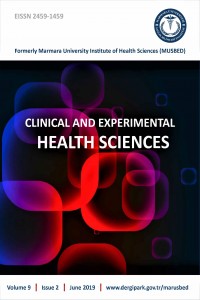Abstract
References
- 1. El-Ebiary AA, Abuelfadl AA, Sarhan NI. Evaluation of genotoxicity induced by exposure to antineoplastic drugs in lymphocytes of oncology nurses and pharmacists. J Appl Toxicol. 2013;33(3):196-201.
Abstract
Objective: DNA damage that can be caused by workplace exposure to antineoplastic drugs in health workers has been shown in many scientific studies. It is aimed to evaluate whether the risk of genotoxicity in health workers decreases after the regulations and measures taken by national and international health authorities in our work.
Methods: For this purpose, DNA damage was assessed by using alkaline comet technique in lymphocytes isolated from blood samples of health workers (n=29) who were involved in preparing and / or administering antineoplastic agent at Trakya University Health Research and Application Center and compared with the control group (n=30). Also, those who prepare and/or administer antineoplastic agents; (n=16) and manual (n=13) preparations.
Results: As a result of the evaluation, there was no statistically significant difference between health personnel and control group in preparing and / or administering antineoplastic agent (p>0,05, Mann-Whitney U) and there was no difference in the genotoxic risk between preparation forms. Furthermore, when the exposed control group was assessed for DNA damage as smokers and nonsmokers, there was no statistically significant difference in terms of DNA damage (p>0.05).
Conclusion: At the center where our samples were taken, the resulting measures resulted in the control of the risk of genotoxicity due to occupational exposure to antineoplastic agents.
Keywords
Alkaline Comet Assay Genotoxicity Antineoplastic Occupational exposure Occupational health safety
References
- 1. El-Ebiary AA, Abuelfadl AA, Sarhan NI. Evaluation of genotoxicity induced by exposure to antineoplastic drugs in lymphocytes of oncology nurses and pharmacists. J Appl Toxicol. 2013;33(3):196-201.
Details
| Primary Language | English |
|---|---|
| Subjects | Health Care Administration |
| Journal Section | Articles |
| Authors | |
| Publication Date | June 30, 2019 |
| Submission Date | April 27, 2018 |
| Published in Issue | Year 2019 Volume: 9 Issue: 2 |


